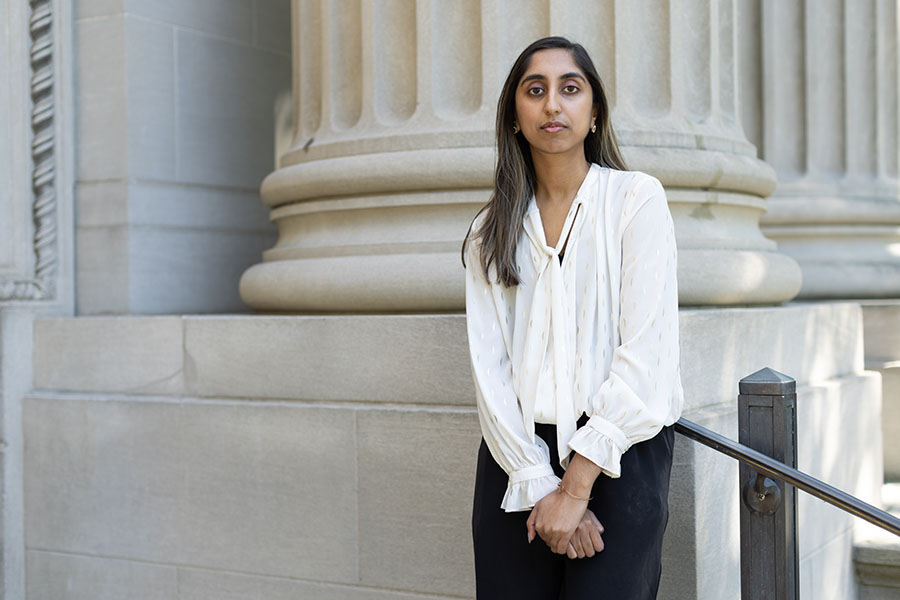Introduction
What most excites you about the SPH Strategic Plan for Antiracism?
“I am really excited about the school’s bold vision and that the plan incorporates not only students, but also faculty, staff, alumni, and other organizations. I also appreciate that it’s a five-year plan and not just a “one-and-done” thing. SPH knows that this work is going to take a lot of time and it shows that they’re really putting in the effort to commit to long -term change.”
Commit
Using “commit” emphasizes a pledge to prioritize antiracist efforts in making SPH a more welcome, equitable, and just organization.
What do you see as your role in antiracism?

I have also been trying to have my voice heard more. As a young woman of color and an introvert, sometimes I feel that people don’t take me seriously and that they assume that I’m just young, naive, or not knowledgeable. I’m not an expert in antiracism, but I’m trying to learn, speak up more, and uplift my own and others’ voices to showcase our ability and credibility.”
How are you committing on a daily basis to antiracism?
“I learn and grow from other activists who are active on social media — especially those who are local to Minnesota — and I follow and share what they’re doing. I also share this knowledge with others, like friends or family, to spark conversations and try to learn more about their perspectives.
One of my hobbies is to listen to true crime podcasts and one that I listen to is Celesia Stanton’s Truer Crime. Stanton, a Minneapolis native, is an incredible storyteller who digs deeper into true crime stories by centering the lives of the victims, the victims’ families, and the flaws inherent in our societal systems. (One reviewer of the Truer Crime podcast writes: ‘Finally, a true-crime podcast that looks at the darkest corners of humanity and instead of providing us with a constant stream of trauma porn, asks us to confront the failures of both our society and justice system and seek better solutions. Stanton delivers the stories with compassion and a keen understanding of abolition and transformative justice.’)”
Challenge
We are “challenged” to accept that racism exists and to “challenge” it when we see it.
What are some ideas you have about how to stand up to racism?
“I think individuals need to be better listeners and actually believe the stories from marginalized individuals and communities. When people haven’t experienced racism themselves, or don’t believe that racism even exists, it’s hard for them to empathize and truly hear what is happening in our communities. Only when we believe can we really start to challenge the systems and laws that are in place. “
What challenges do you face yourself in prioritizing antiracist efforts?
“Two big challenges for me are the Asian Model Minority Myth and internalized racism. My parents emigrated here from India, so I’m a first generation Indian American. The Asian Model Minority Myth stereotypes those who emigrate from Asian countries as tending to have certain careers, aptitudes, etc. There is also internalized racism within the Indian American community such as colorism, where having darker skin is looked down upon. I contend with these complex issues on a daily basis, while also helping to promote voices from all marginalized communities.”
Change
We have to be willing to “change” and shift our beliefs, attitudes, and actions toward equity and justice.
What impact do you think the school can have on racism?
“The school can have lasting effects by producing well-rounded students who are able to incorporate antiracist practices into their public health careers once they go into the real world.
One way it can do this is by teaching students that racism, not race, causes health inequities. I’ve already experienced this teaching in some of my classes. For example, in one class, students brought up issues with an article that found African Americans have a higher chance for a specific disease, but it didn’t go deeper to explain why that might be. The professors really listened to the students, and, during the next lecture, they talked about why they liked the article for teaching about a specific concept, but hadn’t noticed before why it was problematic. They said that they would either find a better article for future classes or use the current article as a teaching opportunity about issues to look out for in research studies.”
What is the most important ingredient for cultural change in our school and as a community?
“We need more representation from marginalized communities to share their stories, experiences, and perspectives.”
“Building Equity, Driving Justice: Commit | Challenge | Change” — ties all communications related to the SPH Strategic Plan for Antiracism together under one look and feel. The theme showcases our guiding principles, and it motivates and inspires. "Agents for Change" profiles support this theme and all interview questions are related to the action words, Commit, Challenge, Change, as described above.
Submit an idea for this profile series — either your own story, or one that inspires you from another SPH individual or group.

